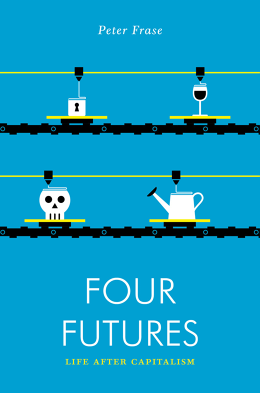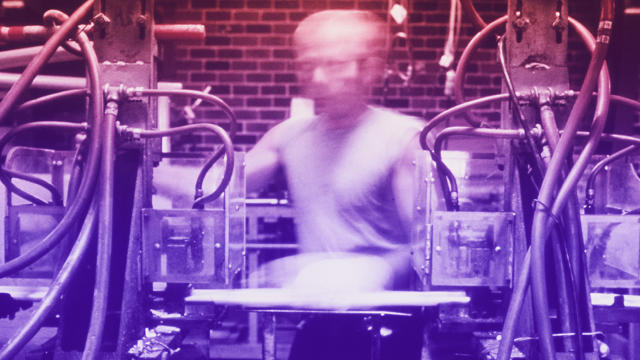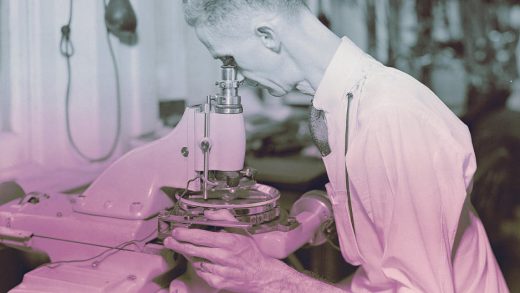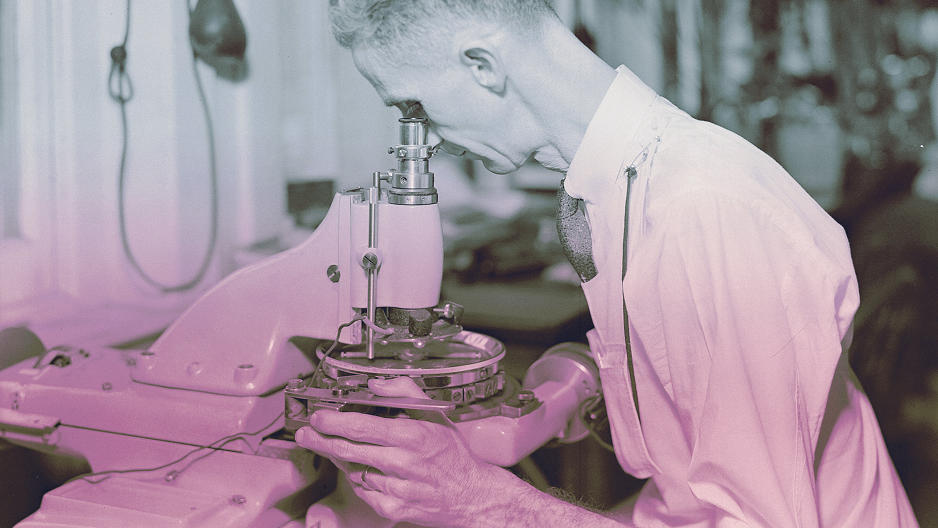Will Robots Usher In A Utopia Or Dystopia?
Will our future of robots and autonomous cars turn out to be a dystopia or a utopia? That’s the question that author Peter Frase grapples with in his new book, Four Futures: Life After Capitalism. A PhD candidate in sociology at CUNY Graduate Center and an editor at the socialist magazine Jacobin, Frase is inclined to believe the former scenario. He dismisses what he sees as the “phony utopianism of Silicon Valley plutocrats,” whom he calls “new-school robber barons.”

In his book, a series of thought experiments about the future, Frase expresses his concern about the real-world consequences of the new age of robotics, worsening climate change, and rising income inequality. Like Chuck Klosterman in his recent book, But What If We’re Wrong?, Frase tries to peer so far ahead into time that it can feel like it doesn’t have any relevance to your life or career, but that doesn’t mean his vision of the future is not worth contemplating.
Frase’s book imagines four future scenarios. In all of them, one thing is constant: rising automation. Visions of a robotic future have gone mainstream in recent years, with widely read articles about the devastating impact it will have on jobs and the economy. According to Frase, these essays have become “an entire subgenre” but required reading nonetheless—describing a likely scenario in which we’re just backseat drivers in our autonomous cars, robots do all the heavy lifting, and IBM’s Watson has graduated from game show oddity to active medical assistant in almost every hospital and doctor’s office around the world, among other things.
Frase believes that the likelihood our future is a utopia or dystopia comes down to two factors: whether we solve or succumb to the climate crisis, and whether we evolve into a society that is more equal or more hierarchical. Laying out the permutations of these two variables yields Frase’s four futures, each of which is granted its own chapter. All our futures will have robots, says Frase (who acknowledges his thought experiment framework is deliberately reductive). But will they have abundance or scarcity, and will they have equality or hierarchy?
Frase calls a world of equality and abundance “communism.” And in imagining it, he takes detours through works of science fiction like Kurt Vonnegut’s Player Piano and the movie WALL-E. A major issue in such a world is the relationship between work and purpose and meaning, and Frase raises the question of whether a work-free world would be depressing to most people. He doesn’t think so, finding a clue in a study that showed that unemployed workers of a certain age ceased to be depressed when they got to “retirement” age; it was the social norm of expected employment, rather than the ways that they spent their days, that affected their well-being.
Similar detours through science fiction, academic research, and Frase’s own imaginings characterize the remaining three scenarios in the book. Intellectual property laws shape a world in which there is abundance and hierarchy: Imagine having to pay a fee every time a robot cleaned your toilet, because of extensive copyright protections on the code that programmed the robot. A world combining scarcity and equality evokes, for Frase, the writings of science fiction novelist Kim Stanley Robinson, with societies compelled to redefine their relationship to the natural world destroyed by their ancestors. The final and most dystopian future Frase imagines is one combining scarcity with hierarchy; he thinks is might look something like the Matt Damon movie Elysium, where a wealthy subset of humanity absconds to a gated community, whether in the heavens or here on Earth. The impoverished masses at the gates might be policed or, more nightmarishly, exterminated.
Fast Company recently caught up with Frase to talk about how his worldview has evolved, the ways technology and politics intersect, and the increasing obligation to consider geo-engineering in a world of worsening climate change.
FAST COMPANY: You’re a socialist. How did you get there?
PETER FRASE: I grew up upper middle class in Minneapolis, Minnesota. My family background is progressive and liberal, but not socialist really. I started to think as a kid, to take the moral impulses of that liberalism to its logical conclusion. I also went to public school, where I was confronted every day with other people who didn’t have the advantages I had. That led me, as a nerdy precocious kid, to the HX section of the library. That was the Library of Congress code for books on Marxism and Communism.
Some of your thinking on Silicon Valley might not endear you to a lot of readers of this publication.
I would say I’m also excited about a lot of technologies coming out of Silicon Valley. I’m not someone who says, “This is all terrible, all bad, we should reject all innovation, which is sometimes how the left is portrayed. What I would focus on is that I think people in the business class, Silicon Valley people, often have this sort of contradictory consciousness. On the one hand, they want to make money, be successful, profit, grow, which entails making choices that benefit the business rather than for any larger collective social purpose. At the same time, they want to believe they’re making life good for everyone. My argument is that people can kind of fool themselves into thinking they’re doing good for humanity, when really they’re only doing good for investors and shareholders.
I think a lot of progressive people in the wake of Trump’s election are having anxieties about their careers. If you’re working for a company and are wondering about how much good it’s doing for the world, what should you do? Quit your job?
You can quit your job and join a monastery, but it doesn’t change the underlying thing that made you uncomfortable in the first place. Sure, there are points at which you might have to take a moral stand, if your job is making killer robots that Donald Trump sends illegally against his enemies. But all of us in a capitalist system participate in systems we don’t necessarily like. The only way to change that is to become involved in some collective political project. So I encourage people to stay with what they’re doing, if they like it, but also to get involved with some political organization. Push for solutions at a larger societal level. And just in general, be a person whose life is more than just your job. If you think that all your political and moral impulses are going to be satisfied just through the job you have, you’re always going to be disappointed. If you’re having moral or political qualms, to me the best way to address that is not necessarily to quit your job, but to start organizing with people trying to make this a better society.

The final future you imagine in your book—you call it “exterminism”—is extraordinarily bleak.
The framework I’m using necessitates you fill that box [i.e., that you explore a future with both scarce resources and a hierarchical society]. I try to get people to not overemphasize that box. The point of the larger project is, all of these are possible futures and aspects of the present, and it’s up to us to fight for the ones we want and against the ones we don’t want.
You wrote the book prior to Donald Trump’s election. Does it change your views at all? Is there anything you’d like to revise?
Not really. If there were something I’d like to revise, it’s much less to do with Donald Trump, and more to do with climate change. Each year that goes by, it becomes more pressing to think about ecological catastrophe. I would say, stay tuned to what I’m going to be doing at Jacobin magazine, thinking through the fact that we are very far down the road of climate catastrophe. We’re so far down the path of climate change that we may need to think about even more large-scale interventions. Simply going carbon-neutral isn’t enough anymore. We may need a deeper engagement with, manipulation, and management of nature. I’m on the fence about even more aggressive geo-engineering, things like cloud-seeding and spraying aerosols. That’s what I’m working through right now. But it’s something we need to take seriously.
This interview has been condensed and edited.
Fast Company , Read Full Story
(32)



